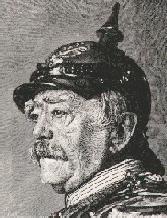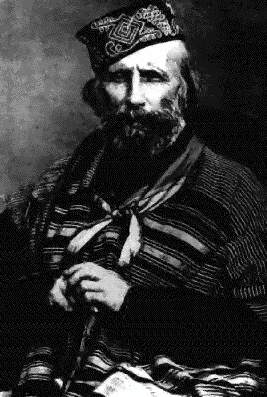
|
| Otto von Bismarck, while maybe not the most respectable of politicians, united Germany. Wow! |
Otto von Bismarck was a conservative man who did some rather liberal things, including supporting nationalism and, later in life, introducing the first ever social security plan. Bismarck was instrumental in the creation of the unified German state, and to that end he has affected the world for eternity, whether you choose to see it in a positive or negative light (some would argue that it was Bismarck's doings that set the stage for WWI, and later, for a man like Adolph Hitler being able to rise to supreme political power.
Otto von Bismarck fact list:
-born April 1, 1815, in Schonhausen, Prussia
-studied law at the universities of Gottingen and Berlin
-started off as a judicial administrator
-chosen to represent Prussia in the Federal Diet in 1851
-after a few years as an ambassador, he became Prime Minister of Prussia in 1862
-his popularity rose after military defeats of Austria and France
-these defeats convinced the largely important German states of Bavaria, Wurttemberg, Baden, and Hesse to join the North German Alliance with Prussia
-German Empire proclaimed in 1870, King William I of Prussia named German Emperor
-in the new Imperial government of Germany, the Reichstag (legislature) had a good level of legislative power, but very little of anything else
-most of the decisions were made by the Chancellor, Bismarck, who only had to answer to the Emperor, not the Reichstag
-Bismarck was, in effect, dictator
-some of Bismarck's proudest achievements include: development of a national bank, a common currency, and codified laws
-Bismarck brought in such previously unheard-of social programs as social security and worker's compensation
-Bismarck was a master diplomat, who signed many alliances and counteralliances, and served as a negotiator between the megapowers of France, Great Britain, Austria-Hungary, and Russia
-his 1879 treaty with Austria-Hungary gave a great push to the conservative cause in Europe, and undoubtedly set the stage for the first World War
-Bismarck was forced to resign in 1890, two years after the crowning of William II, when his ideas were beginning to be thought of as outdate by the majority of German politicians

|
| Giuseppe Garibaldi was a brilliant military tactician with equally impressive fashion sense. |
Giuseppi Garibaldi was a man of many occupations, but whether he was a candlemaker in New York, or a freedom fighter in Italy, he was always good at what he did. He was a tactician like no other, and he was comparable to Napoleon in his ability to recruit volunteer armies quickly, and to be successful with those armies. While other Italian nationalist revolutionaries (Cavour, Mazzini) get alot of credit for their work, it was Garibaldi who arguably did the best and biggest job of uniting the people of the penninsula to fight for unity.
Garibaldi Fact List:
-born in Nice, Piedmont (now part of France) in 1807
-fell under the influence of Mazzini while serving in the Sardinian navy, 1833
-took part in a failed uprising in Piedmont, 1834
-after a death warrant was placed on his head, Garibaldi fled to South America, where he stayed from 1836 to 1848
-while in Latin America, he took part in skirmishes in Brazil, and aided the Uruguayans in their uprising against Argentina; he gained experience commanding Uruguay's diminuitive navy and an Italian legion at Montevideo
-Garibaldi became a national hero in 1848 when he returned to fight in the Italian struggle for independence; he was well-renowned for his battles against the Austrians in Milan and against the French, who were protecting Rome and the papal states
-after finally losing to France in Rome, Garibaldi escaped to live in North Africa, Peru, and the United States, before returning to Italy in 1854
-he led a successful alpine military campaing in the Piedmont uprising against the Austrians in 1859
-in 1860, Garibaldi decided to take Naples and Sicily for the Kingdom of Sardinia, however, the King of Sardinia, Victor Emmanuel II, didn't offer his full support (as he had previously done), and neither did the Premier, Camillo Cavour
-with an army of 1000 volunteers, nicknamed the "Redshirts" for obvious reasons, captured Sicily
-with the aid of local revolutionaries, Garibaldi was able to take the capitol city of Sicily, Palermo
-the taking of Palermo convinced Premier Cavour to pledge his secret support to Garibaldi
-later that year, Garibaldi captured Naples, and handed both it and Sicily over to King Victor Emmanuel II
-Garibaldi then returned to his home on the island of Caprera, near Sardinia, but he still plotted to steal away the papal states from the church's control
-his first try to capture Rome with an army of volunteers
was halted by his friends, the Sardinians, as they were worried that his actions would cause international reprecussions
-his second try was thwarted by the French, which caused him to support the revolutionary, new French republic in the Franco-Prussian war of 1870-71
-he retired to his home on Caprera, where he became more and more disillusioned with politics, finally declaring himself a socialist

|
| Thomas Jefferson furthered the cause of nationalism so much that his colleagues were GREEN with envy |
Thomas Jefferson, while not the most heroic of the American founding fathers, was certainly one of the most vital to that nation's creation. He drafted the Declaration of Independence, and was an ardent supporter of free speech and freedom of religion. His support of the French revolution showed his strong feelings for nationalism, but also made him unpopular with many American politicians at the time. He was quote to say "I have sworn upon the altar of God eternal hostility against every form of tyranny over the mind of man.", and he meant it. He fought for freedom with his quills and paper, and spread nationalist ideals throughout the United States, and, as a result, all of the Western Hemisphere.
Jefferson Fact List:
-born in 1743 in Abermale County, Virginia, to a rich father and socialite mother
-he studied at the College of William and Mary, then went on to law
-as a "silent member" of congress (he wasn't an avid public speaker) in Virginia, he drafted many bills for the state, and, most importantly, he began to ink early drafts of the Declaration of Independence
-he succeeded Ben Franklin as ambassador to France in 1785, and became sympathetic to the revolutionary cause there
-he then went on to be Secretary of State in President George Washington's cabinet, where he conflicted with fellow founding father Alexander Hamilton over his support of the French Revolution
-Jefferson brought his nationalist ideas to the newly formed party he led, the Democratic-Republicans
-the DRs supported the French revolution, and believed in a strong centralized government while still valuing the rights of states
-he ran for President (reluctantly) in 1796 against Hamilton, and subsequently lost by the slimmest of margins
-through a strange constitutional law, Jefferson became Vice President, even though he was far from a supporter of Hamilton's ideals
-After Hamilton's term came to an end, Jefferson became President
-Jefferson was a successful president; reducing taxes on alcohol to appease the westerners, and sending the American navy after the pirates who were disrupting American trade interest abroad
-in 1803, Jefferson bought the Louisiana territory from Napoleon
-throughout his second term, Jefferson attempted to keep America out of Europe's Napoleonic Wars; this proved difficult, as both England and France were mistreating the neutral American merchants in the area
-after his second term, Jefferson returned to his historic estate at Monticello to ponder life's great questions, and work on his plans for the University of Virginia |
